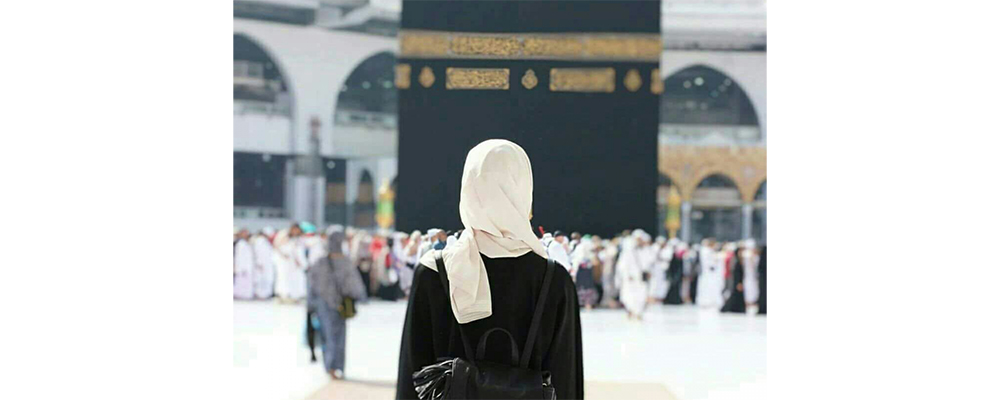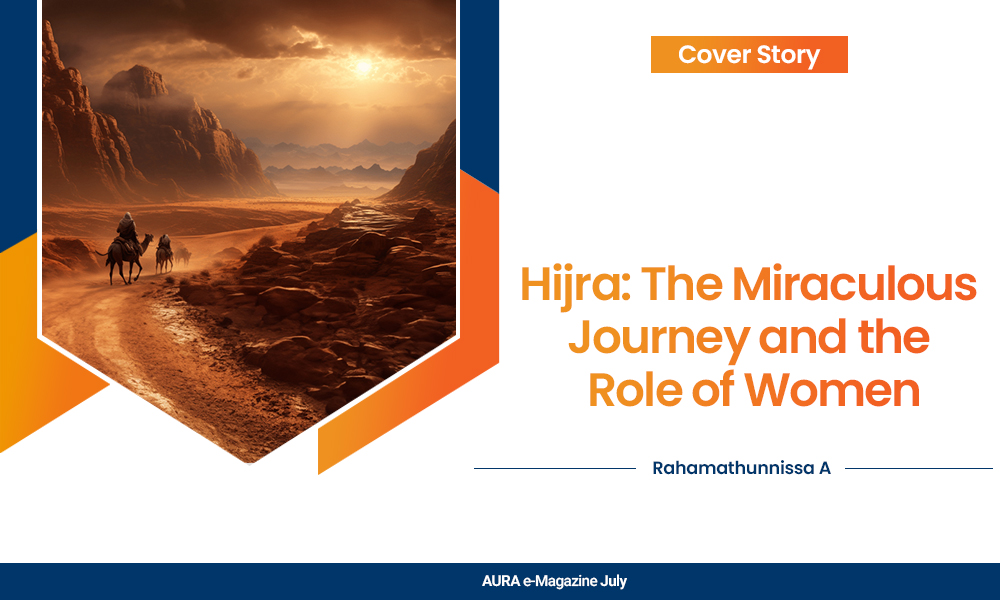
Hijra, the migration of Prophet Muhammed (PBUH) and his followers from Makkah to Madina in 622 CE is a turning point in human history, paving the way for the Islamic model state in Madina which brought goodness in the lives of not only the believers in Madina and nearby places but the entire humanity across the globe. No wonder it has been selected as the starting point of the Islamic calendar. Right from the beginning, this journey had been marked with miracles and divine interventions, making the impossible journey possible for the prophet and his companions. The revolution that it brought to the world is unparalleled.
The following are some of the miracles associated with Hijra:
1) Instruction to migrate: In the month of Rabiul Awwal of the 13th year of prophethood, when most of the believers had already migrated, and only a very few, including the Prophet (PBUH), were left, the Quraysh felt that there was a possibility that the remaining will also leave Makkah. This, they felt, would be more problematic for them. So, they wanted to stop this from happening. A consultative meeting of the chiefs took place. It was decided after considering so many options that “Some persons should be selected from all the families, and they should jointly attack his house at night and cut him into pieces so that all the families might be held responsible for the murder. It is evident that in that case, Bani Hashim will not be able to take revenge on all the families.” But Allah sent angel Jibreel to inform him regarding this. The Qur’an refers to this in the following verse.
وَإِذْ يَمْكُرُ بِكَ الَّذِينَ كَفَرُوا لِيُثْبِتُوكَ أَوْ يَقْتُلُوكَ أَوْ يُخْرِجُوكَ وَيَمْكُرُونَ وَيَمْكُرُ اللَّهُ وَاللَّهُ خَيْرُ الْمَاكِرِينَ
And [remember, O Muhammad], when those who disbelieved plotted against you to restrain you or kill you or evict you [from Makkah]. But they plan, and Allah plans. And Allah is the best of planners. (Qur’an 8:30)
2) The Quraysh getting mystified: On the night of the departure when the appointed men of the Quraysh besieged the Prophet’s (PBUH) house to assassinate him. When the messenger of Allah emerged from his house, he recited the following verse from the Qur’an. He threw a handful of dust toward the besiegers, which miraculously prevented them from seeing the Prophet (PBUH). (Nursi 2010)
وَجَعَلۡنَا مِنۢ بَيۡنِ أَيۡدِيهِمۡ سَدّٗا وَمِنۡ خَلۡفِهِمۡ سَدّٗا فَأَغۡشَيۡنَٰهُمۡ فَهُمۡ لَا يُبۡصِرُونَ
And We have put before them a barrier and behind them a barrier and covered them, so they do not see. (Qur’an 36:9)
3) Natural cover at the mouth of the cave: When the Prophet (PBUH) and his companion Abu Bakr (RA) took shelter in the cave of Thaur to be safe and hide from the disbelievers who were in pursuit of them, two pigeons built a nest and laid eggs at the entrance. In contrast, a spider covered the entrance with a thick web. The pursuers couldn’t see them or have any doubt about someone inside the cave due to this natural barrier, which can be found only in places where there is no movement or presence of humans. It has been reported that Ubayy bin Khalaf, one of the heads of the Quraysh, after examining the cave, said: “This web seems to have been spun before Muhammed was born, and there is a pigeon with a nest and eggs. Would they still be there if someone were there in the cave?”. Abu Bakr (RA) reported regarding this incident. He said, “I said to the Prophet while in the cave: ‘If any of them should look under his feet, he would see us.’ He said, ‘O Abu Bakr! What do you think of two (persons) the third of whom is Allah?’. The Qur’an talks about this in chapter 9, verse number 40.
“Allah helped him at the time when those who were bent on denying the truth drove him away, (and he was but) one of two. When these two were (hiding) in the cave, the Messenger said to his companion, ‘Grieve not. Verily Allah is with us’.
4) Suraqa’s surrender: When the Quraysh failed to catch the Prophet, they declared a huge reward (as much as 100 camels) to the one who could give correct information about him. Suraqa ibn Malik a desert navigator, was attracted by the prize and searched. When he was finally able to almost catch them, the Prophet (PBUH) glanced at him, and his horse sunk in the sand up to its belly. Suraqa understood that Allah intervened to protect His Messenger. He pleaded to the Prophet for forgiveness. The Prophet freed him so he would not tell anyone about their whereabouts when he returned to Makkah. He agreed to this, and history says that the Prophet (PBUH) asked him: “What about a day when you will be wearing the bracelets of Kisra?” It was something unbelievable for Suraqa. He exclaimed, ‘Kisra!?’ The Prophet said, “Yes, Kisra, the son of Hermuz.” Yes, for a man who was fleeing persecution and on the brink of assassination, this promise seemed hardly appropriate.
5) The shepherd forgetting: Another event during the journey is that a shepherd saw the Prophet and his companions on the way. He immediately went to Makkah to inform the Quraysh, but he forgot what he had come for when he arrived there. He tried hard but couldn’t remember, so he had to return. Later, he realised that he had been made to forget.
6) Dry udders of an old goat becoming full by the touch of Allah’s messenger: On the way, the Prophet and his companions reached the tent of Atika bint Khalid al – Khuzaiyya popularly known as Umm Ma’bad, who used to provide food and drinks for travellers. They were very tired and thirsty. But she told them that the flock was taken out to the pasture, and the only goat there was almost dry as it was a rainless year. With her permission, the Prophet (PBUH) touched its udders, reciting the name of Allah, and to everyone’s surprise and joy, plenty of milk flowed out of them. The Prophet (PBUH) first offered the milk to her, shared the remaining with his Companions and drank. Before leaving the tent, he milked the goat again, filled the container and gave it to her. It is recorded that the goat continued to provide milk throughout the year for as many as 18 years until it died.
7) The echo of the verses of Abu Ma’bad: Abu Ma’bad was astonished to see milk in the house when he returned. When Umm Ma’bad narrated what happened, he realised that it was the Prophet (PBUH) whom the Quraysh were searching for. He reiterated his admiration in the form of a poetry that echoed all over Makkah to such an account that the Makkans thought it was a Jinn inculcating words in their ears (Some scholars believe that it is a Jinn. Allah knows best). Anyway, it was a great relaxation for people like Asma’ the daughter of Abu Bakr, who was worried about the Prophet (PBUH) and his companions since the topic of the poem was to offer thanks to Allah for allowing the Ma’bads to host the Prophet (PBUH) for a while. This hinted that they had been on the right track and safe. The poem ended with an invitation to all mankind to come and see Umm Ma’bad, her goat and the container of milk that would testify to the truthfulness of the Prophet.
Role of Women:
From planning and preparation for smooth and safe travel to physically being part of it, women played a crucial and significant role in Hijra. Some of the most remarkable ones are below:
1) Participation in Aqaba treaty: Many plans and preparations took place before the actual Hijra happened. The most important among them are the two Aqaba treaties between the people of Yathrib (today’s Madina) to ensure the safety of the immigrants. The second Aqaba treaty is marked by the active participation of two women named Nusaiba bint Ka’ab and Asma Bint Amr. It was as part of fulfilling her promise at the treaty that Nusiba bint Ka’ab, popularly known as Umm Ammaarah, protected the Prophet (PBUH) at the battle of Uhud. She was highly praised by the Prophet (PBUH) for her brave act when there was utter chaos, and even men were confused about what to do. The Prophet says that …. She received on her body as many as 12 arrows, which were shot targeting the Prophet (PBUH).
2) The role of Asma Bint Abu Baker: It was Asma (RA) who served food for the Prophet and her father, Abu Bakr (RA) while they were in the cave. She did so secretly, climbing the mountain as huge as at odd hours to escape the view of the Quraysh who were searching for them far and wide. The Prophet acknowledged her contribution by calling her Dhat – an – Nitaqain’, meaning ‘owner of two belts’. He did so to appreciate her tying the food container by dividing her waist belt lengthwise, as she did not have anything else for that purpose. The Prophet (PBUH) said she would get two belts in paradise. A seven-month-pregnant woman could make it all possible only because of her strength of faith, which made her feel strong and courageous.
3) The role of Umm Ma’bad: Umm Ma’bad was a generous lady who sat at her tent with a mat spread out for any chance traveller that might pass by that way. Apart from the miraculous incident of her goat giving milk, as described earlier in this article, she gave the Prophet (PBUH) and his companions proper guidance on how to reach Madina. Her description of the prophet to her husband attests to her poetic talent and observation skills. She described him as follows: “I Saw a man of visible radiance and purity, beautiful in appearance, bright-faced with neither protruding ribs nor a small head, handsome and fair. His eyes were deep and black and large and his eyelashes were lush. His voice was mellow and soft. The whiteness of his eyes was bright and his pupils were very black. His eyebrows were beautifully arched and connected. His neck was long, his beard densely full. When he was silent, he appeared dignified. When he spoke, he was eminent and crowned with magnificence. His speech was sweet, his words precise, neither too little nor too much like a string of pearls flowing down gradually. He was the most striking and beautiful of people when seen from afar and the fairest of them when seen up close. He was medium height, neither unagreeably tall nor scornfully short, a branch between two branches. Among the three he was the most radiant in appearance, the finest of them in stature. He was surrounded by companions. When he spoke, they listened attentively. When he gave orders they hastened to fulfil them. Honoured, served and surrounded by followers, he neither frowned nor criticized.” (Al Baihaqi and Al Hakim)
In short, Hijra serves as a testament to the power of faith, courage, resilience and the unwavering trust in the Divine plan by the believing men and women. It was made possible by the intervention of the Almighty as a reward to the believers’ readiness to sacrifice. It is an inspiration to generations and the remarkable role played by women proves the importance given by Islam in recognising and involving women in all walks of life. It gives the message that if you are ready to do whatever is possible on earth for the betterment of your condition and that of the people around you with a firm faith in your Creator’s might, there will definitely be help from above through means that you couldn’t even imagine.



0 Comments